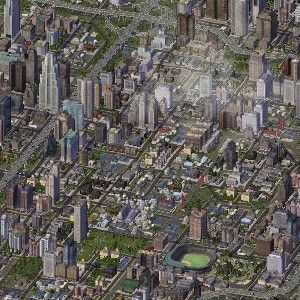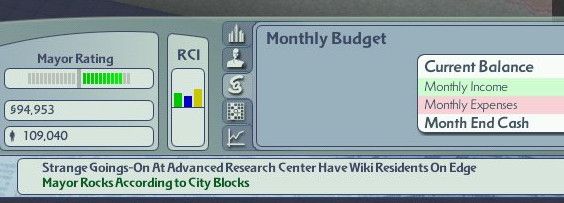The city builder is a genre that’s nearly disappeared over the last decade. It’s a victim of the market. City builders aren’t the kind of flash-bang titles that big publishers usually love, but they’re also too complex for most small studios to tackle.
Electronic Arts will finally revive the SimCity franchise next year, but until then there are only a few modern options, which I highlighted in a previous article. They’re all fun games, but SimCity 4 is still the standard in the genre. If you haven’t played the game recently – or *gasp* at all – here are five reasons to fire it up.
Easy In
http://youtu.be/RYiGC8Y5ddM
SimCity 4 is a simulation game, but it’s no IL-2 Stumorvik. The game is designed to be friendly and accessible to all players. This is an Electronics Arts title, after all, and it was developed alongside The Sims. There’s even an option to import your Sims character.
What this means is that you’ll find plenty of tutorials and an easy difficulty level that’s well worth its name. Even the medium difficulty setting gives you plenty of money for early growth. You can screw up in SimCity 4, and badly, but it won’t be because you don’t know the difference between a residential zone and an industrial zone.
The game also benefits from its age and 2D graphics. You can run the game on just about anything. It was made before widescreen displays were popular, however, so you’ll need to use a minor tweak [Broken URL Removed] to make the game look nice on large monitors.
Flavor Text
The SimCity franchise has a long history of informative silliness. I still remember the newspapers from SimCity 2000, a game I played endlessly in my youth. They were funny but also helpful. Without them I would have far less knowledge about what was happening in my city.
SimCity 4 actually improves the concept by introducing a small window that displays a variety of issues as they appear. Some are silly non-issues meant to lighten the game. Others are praise for the things you get right. And a few are serious issues that need to be resolved if you want your city to grow.
This seemingly minor feature is one of SimCity 4’s greatest advantages over many more modern city builders. When you screw up in SimCity 4, you usually have a good idea why, because the game tells you. It will even direct you to the exact intersection that’s clogged up or the exact neighborhood with too much crime.
Constant Challenge
http://youtu.be/gbVQXBx_VAg
The wealth of information doesn’t make the game a cakewalk, however. The general agreement among fans of the series is that SimCity 4 is, beneath its friendly exterior and box art, a pretty hardcore game. But the challenge doesn’t come from figuring out the problem. It comes from figuring out what to do about it.
Sitting down and enjoying your city does sound nice to some players, I’m sure, but it doesn’t make for much of a game. The more recent Cities XL is a good example. That title is beautiful and allows for wonderful cities that are full of interesting buildings. But I grew bored with it, and most reviewers expressed similar disinterest. It was just too easy, and staring at your city’s skyline is interesting for only so long.
SimCity 4 is difficult. Your first five cities will probably stall out or go bankrupt. It can be disappointing, and frustrating, but it also gives you a reason to try again. There’s always a new strategy to try.
Fake Realism
http://youtu.be/D017oCoc43A
There are a lot of things to like about SimCity 4, but its greatest accomplishment its realism. The game abstracts city management in many ways, but those abstractions don’t make the game feel transparent. Instead they make it feel like an accurate reflection of real life.
A situation from my recent game is an excellent example. I built a new city with a focus on high-density, high-value residential neighborhoods. These bring in more tax dollars without taking up more space.
Higher density means more demand on roads, however, and the volume of demand took me off guard. I discovered my layout was inefficient, so I had to rip up some residential neighborhoods and widen the streets to avenues – a costly development project. I also had to increase services and begin a metro bus service. Before I knew it, costs were out of control, and my plan began to fall apart. I had to deal with high traffic for several in-game years before I had the money to completely resolve the problem.
These are the problems real cities face, and they are the problems you’ll face in SimCity 4. They are difficult, but they feel real, and playing the game may give you more respect for the challenges faced by real-life city planners.
It’s Still The Best
There have been some popular city-management games of various types since the last title in the SimCity franchise. Some of them are quite good. I’m particularly fond of Dawn Of Discovery and its economic model, which focuses on the demand for certain goods.
Yet there’s no doubt in my mind that SimCity 4 remains the game to beat. It’s a perfect balance of accessibility, challenge and fun. Dawn Of Discovery feels obtuse and too abstract while both Cities XL and Tropico are a bit too easy.
The new game in the franchise, which is simply called SimCity, will be released in 2013. It looks promising so far, but SimCity 4 is the standard it will be compared to. I don’t envy the developers trying to top it.
Oh, and if you do decide to pick up the game after reading this article, make sure you buy the Deluxe Edition. It includes the wonderful Rush Hour expansion.


